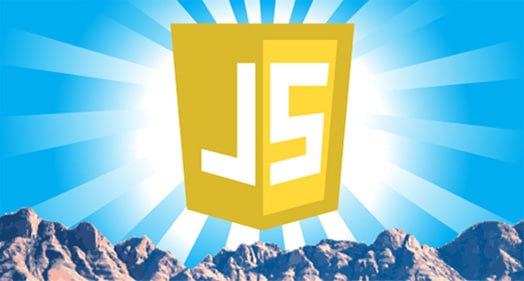WEB 205: JavaScript for Designers I
Learn to code and develop basic Web applications.
Learn the fundamentals of JavaScript, the programming language that allows you to make things happen when a user interacts with your website. You will learn how to create clean, valid code as you create programs that respond to various kinds of user interaction. Assignments include a range of projects: interactive dialogue boxes, a trivia quiz, a rainbow color picker, a sortable database, and more.

About This Course
Project-Based Learning
Coding projects will focus on step by step application of JavaScript concepts in fun projects that include a call and response, interactive quiz, JavaScript Rainbow, scheduling application, and basic encryption program.
What Skills Will I Develop?
Students in this course can expect to learn to:
- Develop clean, error-free JavaScript code to accomplish specific programming tasks.
- Write basic JavaScript programs to capture web user input, manipulate it, and provide relevant output.
- Create and deploy fundamental JavaScript expressions and statements.
- Define and use variables and operators.
- Utilize common methods for handling types of data.
- Explore the general hierarchy, methods, and properties of DOM objects.
- Utilize JavaScript properties and methods to access and manipulate web page elements in the Document Object Model (DOM).
- Use variables, functions, event handlers, and conditionals to develop basic applications with flow control.
- Employ arrays and for-loops to access, sort, and display web page data.
- Apply general principles for writing elegant, streamlined code.
- Encapsulate your code to avoid conflict with other applications.
What Software and Supplies Do I Need?
- Computer with a minimum internet connection speed of 512 kbps. Broadband is strongly recommended.
- Free web hosting provided by Sessions College to enrolled students.
- HTML and CSS course or equivalent experience in hand coding HTML and CSS and publishing files to the Web.
- Adobe Creative Cloud: Photoshop or equivalent digital imaging program.
Course Instructor(s)
The course is taught by the following instructor(s):

Walt Dombrowski is a web developer and trainer with 20 years of professional experience. Walt has worked in both front-end and back-end operations with clients from 23 different countries.
Course Outline
A Morning Jolt of JavaScript
It's time to wake up, smell the coffee, and get to grips with JavaScript. You will begin your course exploring how JavaScript adds interactivity to web pages. You will learn how to set an HTML document for a JavaScript program, and begin writing statements and expressions. We'll learn fundamental rules for how to write clean code and explore how to use variables and operators, handle different data types, and use basic functions so you can respond to user input.
Getting Logical and Functional
This week, you'll expand on what you've learned about variables, dive into writing your own functions, and discover how to write programs that make decisions based on user input. You'll learn how to use Boolean values, conditionals, comparison operators, and if statements to build flow control into your programs. You'll expand your knowledge of handling data to include string methods and math methods.
The Dominion of the DOM
JavaScript can interact directly with a web page, allowing us to alter any page in response to user input. In this session, we'll explore how to use JavaScript to access and control the Document Object Model. We will explore the hierarchy, methods, and properties of DOM objects and examine how to remove and append HTML elements in the DOM. You'll learn how to alter the content and appearance of DOM elements and how to create events and event handlers to respond to them.
Collect Your Thoughts With Arrays
What's next in your voyage? This week, you'll expand your knowledge of the use of objects and data types. As a first step towards handling databases, you'll examine arrays and learn how to count their members. We'll look at how for for-loops are used to repeat programming tasks until complete. You'll learn how databases are constructed from arrays and how to use for-loops and nested for-loops to access your data.
Application and Implementation
In this session we will explore how to push your JavaScript knowledge even further. We'll talk about the importance of reverse engineering applications to figure out how programs work. You'll learn how to pick an entire "array" of DOM elements, attach event attributes to HTML tags, use compound conditionals, nest if statements, use while-loops, and harness Date objects. Adding these techniques will enable you to build progressively more sophisticated and elegant programs.
Application and Implementation
The final lecture focuses on how to make your programs more elegant, functional, and interoperable with other programs. We'll reviews some ways to make code condensed and faster acting, such as using ternary expressions. We'll discuss how to encapsulate your programs and to avoid conflicts with other programs. Finally, we'll discuss how to find and replace content in web pages or programs.
Frequently Asked Questions (FAQ)
How Do The Courses Work?
Our courses are project-based and instructor-led. In each course you’ll complete a series of lectures, projects, discussions, and critiques designed to stretch your creative skills. Weekly assignment deadlines keep you on track, and with no set-logins or Zoom meetings, you can build your studies around your schedule.
Who Are The Instructors?
Our courses are developed and taught by our industry-leading faculty of creative professionals. This means that you’ll learn in-demand skills, get feedback on your work, and build a portfolio of creative work. View our Student Gallery for featured student projects.
When Can I Start?
Classes start January, April, and August, and this course is completed in a 15-week term. College credit from this course can be applied to a range of Degree and Certificate programs at Sessions College. You can enroll in this course on an individual basis or as part of a program.
Explore our Programs: Bachelor's Degree | Associate Degree | Undergraduate Certificate
How Do I Register?
To register for a program, complete our program application. To register for this course on an individual basis, please contact our admissions team at admissions@sessions.edu. An Admissions Advisor will contact you to setup your enrollment.
| Course Tuition and Fees | |
|---|---|
| Tuition | $350/credit |
| Registration Fee* | $200 |
| Total Course Price | $1250 |
Registration fees are nonrefundable after 5 days from enrollment.
Is Sessions College Accredited?
Yes. Since 2001, Sessions College has been accredited by the Distance Education Accrediting Commission (DEAC). The Distance Education Accrediting Commission is listed by the U.S. Department of Education as a recognized accrediting agency and is recognized by the Council for Higher Education Accreditation (CHEA).
RELATED PROGRAMS AT SESSIONS COLLEGE:

